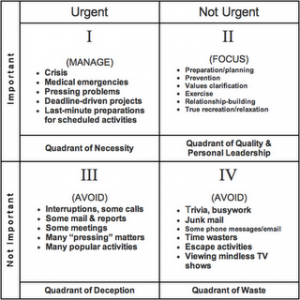-
7 Time Management Tips for Small Business Owners
in Small Business Management on April 30, 2020
Share with your friends or professional networkFor many entrepreneurs, it seems there aren’t enough hours in a day. But, Zig Ziglar points out, “Lack of direction, not lack of time, is the problem. We all have twenty-four hour days.” The bottom line is that time management is an essential skill for effectively managing a small business. In this post, we will cover seven tips to help you make the most of your time.
1- Make a plan and work it. According to professional development expert, Brian Tracy, “It takes only about 10 to 12 minutes for you to plan out your day, but this small investment of time will save you up to two hours (100 to 120 minutes) in wasted time and diffused effort through the day.” Commit to setting aside planning time each day, prioritizing tasks so you can maintain your focus throughout the day.
2- Prioritize realistically. Don’t confuse the urgent with the important, and instead of working longer, work smarter. In his book, “First Things First,” Stephen Covey suggests that in order to determine what to do first, you can organize tasks into quadrants containing what is urgent, not urgent, important, and not important. Give priority to the urgent and important, then focus on the non-urgent, important matters. And avoid the unimportant matters altogether if possible.

3- Schedule meetings or calls in advance. Be sure to put all your meetings and appointments into a planner or online calendar. Because there is a tendency to waste time leading up to a meeting, try to schedule meetings in blocks, preferably in the morning, so you have the rest of the day for your other tasks. Also, be sure to prepare notes and an agenda to help keep you on task and on topic during your meetings.
4- Manage distractions. To avoid being distracted, turn off pop-up notifications on your computer and schedule time to focus on your email only at specific times of the day. You can control the time you spend checking your texts, voicemail, and other mobile activities by scheduling breaks to do those things. Set your phone out of easy reach, but if it’s not feasible to do so, turn off notifications and pop-ups for your personal apps and email. Identify where you are wasting time. If you don’t already, track your time (even if it’s for a week or two), so you can reduce your time wasters and improve your productivity.
5- Delegate or say “no.” The purpose of delegating is to use your time more effectively. Calculate how much it costs for you to complete tasks, then figure out if someone else inside or outside your company can do them for the same or less money. If you can’t delegate, consider saying, “no.” It’s hard for entrepreneurs to turn down a paying project, but if you miss an ideal project because you were toiling over a difficult one, you could be losing money and enjoyment.
6- Relax and get some sleep. All work and no play make Jack a tired and unproductive boy. Lack of sleep universally takes a toll on job performance. Sleep-deprived workers have “reaction times about 50 percent slower than their well-rested counterparts, and are more likely to make mistakes on simple tasks.” In a study entitled, “Why sleep matters — the economic costs of insufficient sleep,” the United States was found to be the global leader in economic losses from bad sleep habits, losing approximately 2.92 percent of its total GDP (i.e., $411 billion of lost productivity) due to sleep deprivation. Get sleep, recharge, and work more productively and efficiently, and you will ultimately save yourself time in the long run.
7- Use FuelGauge. FuelGauge’s cloud-based cash flow projection software saves you time by helping you manage project chaos, make data-driven business decisions and plan with confidence. Any time you can get insight without spending a lot of time, we say, “go for it.”
Did we miss any good tips? Let us know how you do it. Connect with us on Facebook, and share your tips for time management.